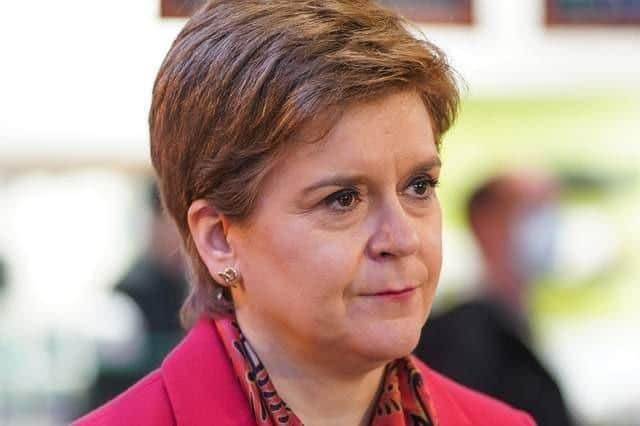Income tax cuts: Nicola Sturgeon indicates she will not replicate UK tax cuts for high earners
The First Minister slammed last week’s mini-budget as “fiscally disastrous” and insisted Scotland would continue to have a “progressive tax system”.
It came as the Bank of England said it “will not hesitate” to raise interest rates to prop up the value of sterling after a day of turmoil on the markets, which saw the pound slump to its lowest level for at least half a century.


Advertisement
Hide AdAdvertisement
Hide AdUK Chancellor Kwasi Kwarteng will bring forward the announcement of a “medium-term fiscal plan” to start bringing down debt levels following an adverse reaction to his £45 billion package of tax cuts set out on Friday.
The Treasury said it would now be published on November 23, having previously been slated for the new year, and will include further details on the Government’s fiscal rules, including ensuring that debt falls as a share of GDP in the medium term.
Mr Kwarteng previously announced a series of measures including the scrapping of the top rate of income tax for those earning £150,000 a year or more and a cut in the basic rate to 19p in the pound.
These do not apply in Scotland, where control over income tax rates and bands is devolved.
If the Scottish Government does not follow suit, everyone earning more than £14,732 in Scotland will pay more income tax than they would in the rest of the UK.
Someone on £30,000 would pay £195.80 more next year, while those on £50,000 would pay £1,863.40 more.
High earners in Scotland would pay an additional rate of 46 per cent on earnings of more than £150,000, while those in the rest of the UK would pay 40 per cent.
This means someone earning £200,000 would pay £6,045.80 more in income tax, according to the Chartered Institute of Taxation.
Advertisement
Hide AdAdvertisement
Hide AdSpeaking to Bauer Media on a visit to Graham’s dairy in Bridge of Allan, near Stirling, Ms Sturgeon said: "Not to invest in the overall health and wellbeing of the country, but to make a relatively small number of already rich people even richer – it’s morally indefensible. It’s morally abhorrent what the Chancellor outlined on Friday, but as we’re seeing in real time it is also fiscally reckless.
"It’s going to lead to higher interest rates, which will hit mortgage payers. It will hit people with other debt repayments. And it’s going to continue to fuel inflation, which makes the cost-of-living crisis worse.
"It is hard to exaggerate the damage that this UK Government is doing right now.
"The House of Commons, in my view, should be recalled immediately to get some order around this, before this Prime Minister and Chancellor do any more damage to the UK economy.”
She added: “I find it really impossible to get my head round the fact that we have a budget from the UK Government that everybody, apart from the most tribal Tory supporters, thinks was a serious mistake, morally repugnant and fiscally disastrous, but somehow the Scottish Government should just follow suit and make all the same mistakes.
"We will not do that. We will take decisions, carefully, that are about helping those who need it most, continuing to have a progressive tax system and continuing to take the kind of actions … that are about building an economy that is diverse, healthy and sustainable for the longer term.
"And the route to that is not cutting tax in a hefty way for the very wealthiest in society.
"So we’ll take careful, sensible decisions, and the fact that they’re sensible will put them in stark contrast to what we’ve seen from the Chancellor in recent days.”
Advertisement
Hide AdAdvertisement
Hide AdThe First Minister will appear before a meeting of the Scottish Parliament’s committee conveners on Wednesday, where the cost-of-living crisis is set to be a focus.
Earlier, John Swinney, the Deputy First Minister and acting finance secretary, told BBC Radio’s Good Morning Scotland programme: "We take an approach to taxation which is driven by the principles of fairness and ensuring we have a progressive character to our tax system."
He will present an emergency budget review to the Scottish Parliament within the next two weeks, with decisions on tax expected to be set out as part of the budget process later in the year.
Scottish Conservative finance spokeswoman Liz Smith told the BBC: "The challenge now is for the Scottish Government to match some of these changes, because what we can't have is a widening gap between the tax agenda in Scotland in comparison to the UK."
Comments
Want to join the conversation? Please or to comment on this article.

